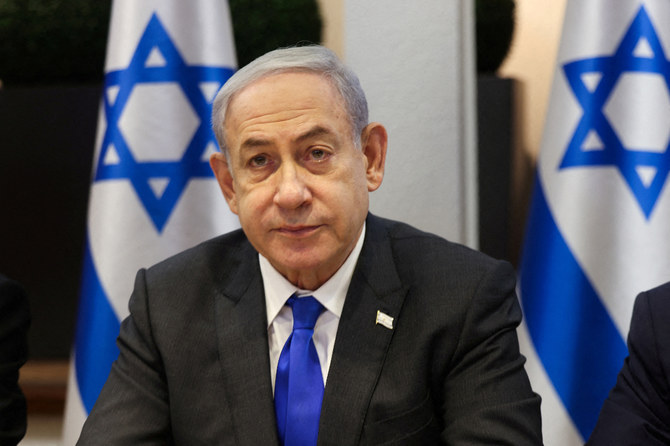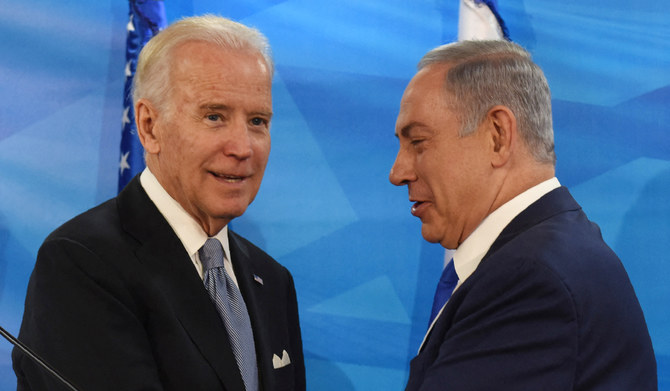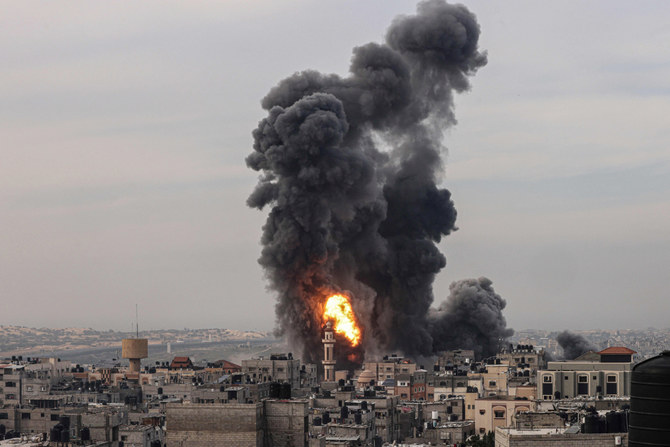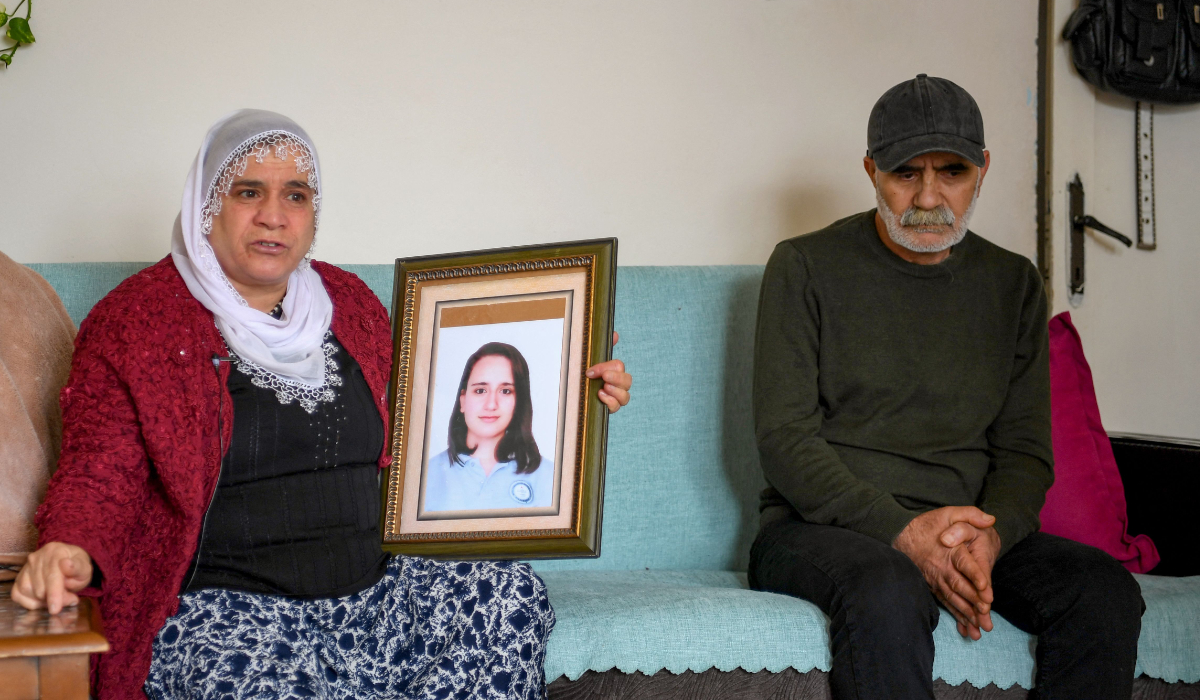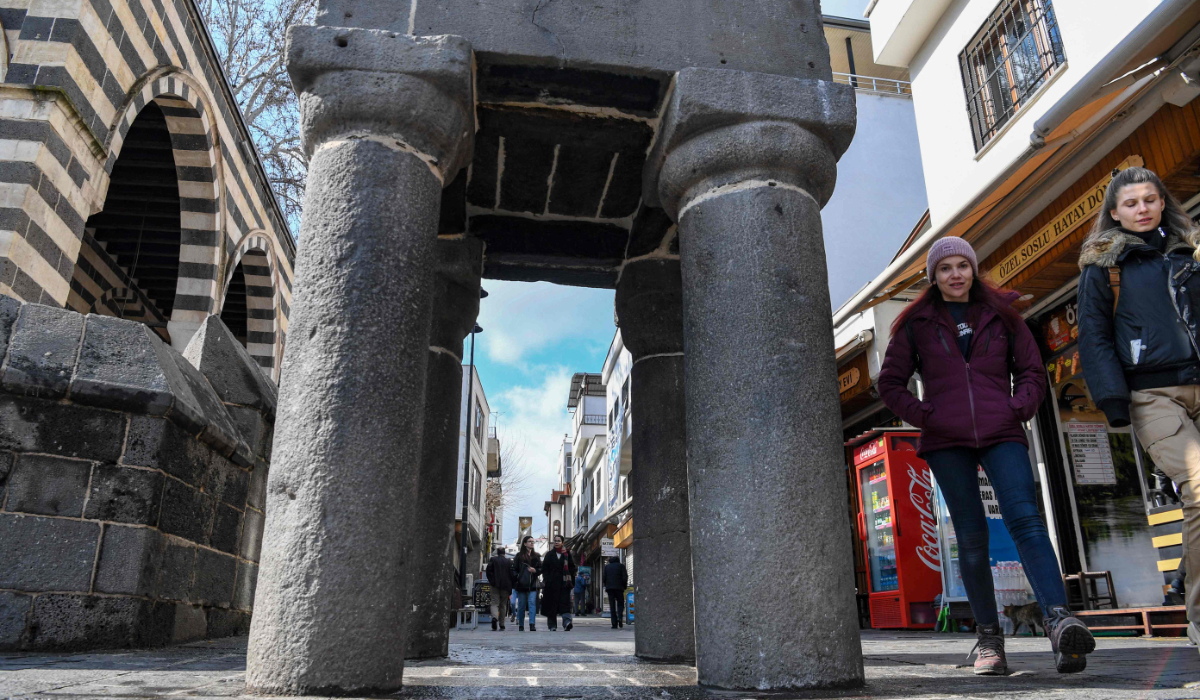JERUSALEM: Israeli Prime Minister Benjamin Netanyahu said Sunday that the Gaza war was exacting a “very heavy price” as the toll of soldiers killed in fighting with Hamas mounted.
“This is a difficult morning, after a very difficult day of fighting in Gaza,” he said after the army announced 14 soldiers had been killed in the Palestinian territory since Friday.
“The war is exacting a very heavy price... but we have no choice but to keep fighting,” he added in a statement.
“We are continuing with full force until the end, until victory, until we achieve all of our goals: the destruction of Hamas, the return of our hostages and ensuring that Gaza will never again constitute a threat to the State of Israel.”
He added: “Let it be clear: This will be a long war... (until) Hamas is eliminated and we restore security in both the north and the south.”
Since Israel’s ground assault began on October 27, the military has lost 153 soldiers in the Palestinian territory, including 10 on Saturday, making it one of the deadliest days for the army, which is also facing Hezbollah militants across its northern border with Lebanon.
Gaza war rages on Christmas Eve
Israel pushed on Sunday with its military campaign to destroy Hamas over the October 7 attacks, as the focus of the deadly combat shifted to southern Gaza where most displaced Palestinians are trapped.
US President Joe Biden stressed the “critical need” to protect civilians, in a call with Prime Minister Benjamin Netanyahu, who vowed Israel would “continue the war until all of its goals have been achieved,” officials said.
As heavy fighting raged on, the Israeli army said it had struck another 200 targets in the past 24 hours in the besieged Palestinian territory where it is seeking to defeat Hamas and free remaining hostages.
The army said soldiers had raided a northern Gaza compound near schools, a mosque and a clinic and found “explosive belts adapted for children, dozens of mortar shells, hundreds of grenades and intelligence documents.”
Hamas rejected those claims as lies meant “to justify their massacring of innocent civilians and their destructive aggression that has affected the entire infrastructure... in the already blockaded Gaza Strip.”
The bloodiest ever Gaza war broke out when Hamas attacked southern Israel on October 7 and its Islamist militants killed about 1,140 people, mostly civilians, according to an AFP tally based on Israeli figures.
The gunmen also seized around 250 hostages, 129 of whom are believed to remain in Gaza following the exchange of captives for Palestinians prisoners during a week-long truce late last month.
Israel’s withering military campaign, including massive aerial bombardment, has killed 20,424 people, mostly women and children, according to the Hamas-run territory’s health ministry.
Vast areas of Gaza lie in ruins and its 2.4 million people have endured dire shortages of water, food, fuel and medicine due to an Israeli siege, alleviated only by the limited arrival of aid trucks.
Eighty percent of Gazans have been displaced, according to the UN, many now shielding against the winter cold in makeshift tents and forced into the south of Gaza even as ground fighting comes closer.
Near the far southern Gaza city of Rafah, Umm Amir Abu Al-Awf, 27, suffered wounds to her hand and legs in a strike on her house early Sunday.
“Who won?” she said. “Nothing has been achieved except killing civilians... They keep saying Rafah is safe. It is not safe. Nowhere is safe. Every house has a martyr and injured.”
Expanding the offensive
Israeli military spokesman Jonathan Conricus indicated that forces were close to gaining operational control in northern Gaza and that now “we focus our efforts against Hamas in southern Gaza.”
Fighting has raged in the main southern city of Khan Yunis, the birthplace of Yahya Sinwar, Hamas’ leader in Gaza and the man Israel holds most responsible for the October 7 attack.
Elsewhere, Palestinian rescuers scrambled again to pull survivors and bodies from the rubble of a destroyed residential building, after a strike hit in the central city of Deir Al-Balah.
“I was praying when a huge explosion occurred,” said Yazan Moqbel, a wounded man whose sister was still under the broken concrete. “Rubble fell on us. I didn’t know what happened.”
The head of the UN refugee agency, Filippo Grandi, urged an end to the suffering in the third month of the war.
“For aid to reach people in need, hostages to be released, more displacement to be avoided and above all stop the appalling loss of lives, a humanitarian cease-fire in Gaza is the only way forward,” he wrote on X, formerly Twitter.
“War defies logic and humanity, and prepares a future of more hatred and less peace.”
On Friday, the United States allowed the passage of a UN Security Council resolution that effectively called on Israel to allow “immediate, safe and unhindered” deliveries of life-saving aid to Gaza “at scale.”
World powers had wrangled for days over the wording and, at Washington’s insistence, toned down some provisions — including removing a call for a cease-fire.
One displaced Gazan, Ahmad Al-Burawi, now living in Rafah in southern Gaza, said: “We just want to return to our lands, that’s all. We want a solution... People are dying.”
Cancelled celebrations
As the war rages on, Christians around the world celebrate Christmas Eve, and festivities are usually held in the occupied West Bank city of Bethlehem where they believe Jesus was born.
But this year the city is almost deserted, with few worshippers around and no Christmas tree erected, after church leaders decided to forego “any unnecessarily festive” celebrations, in solidarity with Gazans.
Palestinian president Mahmud Abbas voiced hope Christmas would mark “a cessation of the Israeli war against the Palestinian people in Gaza, as well as across the occupied Palestinian territories.”
The Gaza war has heightened tensions across the Middle East, where Israel faces a range of enemies — Iran-backed armed groups in Lebanon, Syria, Iraq and Yemen that have voiced strong support for Hamas.
Cross-border fire has erupted almost daily between Israel and Lebanon’s powerful Hezbollah movement.
And Yemen’s Houthi rebels have fired at cargo vessels in the Red Sea, leading the United States to build a naval taskforce to deter the missile and drone strikes.
The US military said four drones had targeted the USS Laboon, but had been shot down, and that an Indian-flagged tanker was hit and sent out a distress call.
Iran’s deputy foreign minister, Ali Bagheri, denied the Islamic republic was orchestrating the campaign, saying the Houthis act on their “own decisions and capabilities.”
British Foreign Secretary David Cameron, in an interview published Sunday, branded Iran “a thoroughly malign influence in the region and in the world.”


